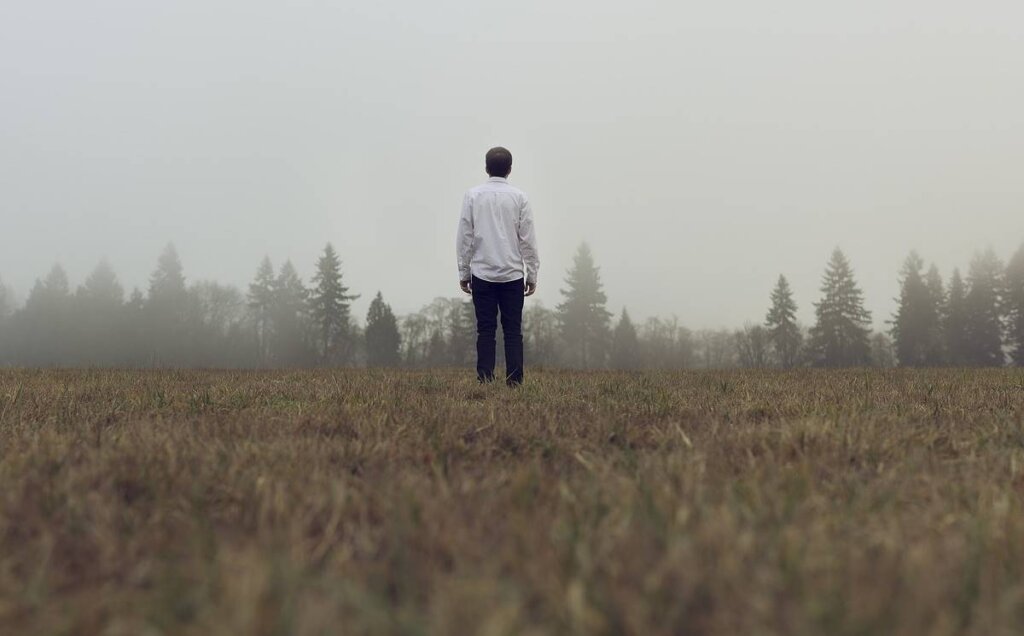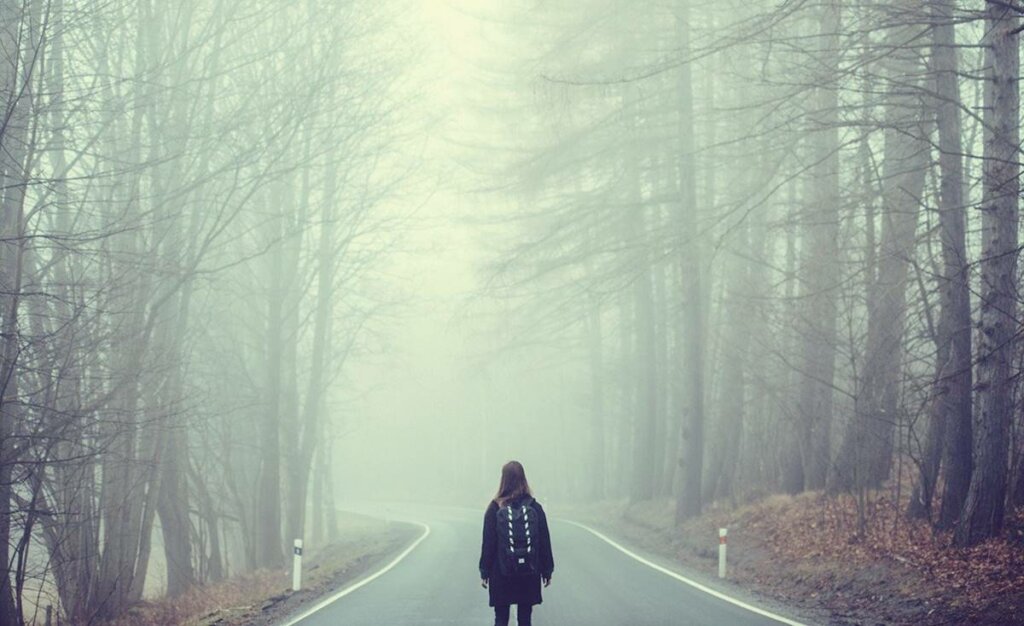Knowing How to Get Lost to Find Yourself Again


Written and verified by the psychologist Valeria Sabater
The art of knowing how to get lost requires being open to uncertainty, the unknown, and the unpredictable. It involves saying goodbye to everything that offers you security. That’s because today’s world is so dominated by technology, Google, GPS, and tutorials of all kinds, we’ve become overinformed (and overprotected) people who want to have everything under control.
Perhaps you don’t see this as a problem. After all, you might enjoy the fact that your life is perfectly planned out. You make sure you prepare every event, decision, or change in advance. You ask Siri or Alexa when you want to know something, program your trips with sophisticated apps, and even create to-do lists that remind you what you’re supposed to be doing at any given moment.
Furthermore, you don’t like the unexpected, the unknown scares you, and everything that isn’t already written on your life script throws you off balance. You’ve become an automaton of predictability. However, this isn’t a good thing. In fact, as Rainer Maria Rilke said, uncertainty isn’t an obstacle, it can be a source of life. The best path for inspiration and self-discovery.
Sometimes, in order to find yourself again, it’s worth getting lost and opening the door to the unexpected.
When you lose yourself, you’re more attached than ever to the present, to the here and now. It’s then that you’re able to embrace mystery and uncertainty and discover what surrounds you. You find you’re able to make new decisions and take new paths.

The art of knowing how to get lost
You’ve probably had moments in your life when you suddenly stopped and asked yourself what you were doing with your life. In fact, feeling lost can be one of the most stressful experiences. You don’t know whether to continue on the same path or drop everything and start over. In effect, to start with a clean slate.
This overwhelming feeling of ignorance and uncertainty is a reality that’s been explored by multiple figures. For example, Rebecca Solnit is a well-known American writer who, in 2005, published an interesting book, A Guide to the Art of Getting Lost. In it, she explored what for her and many philosophers is the exhilarating experience of wandering, getting lost, and embracing the unknown.
It’s worth remembering what the writer, poet, and philosopher Henry David Thoreau said: we only find ourselves when we’ve had the courage to lose ourselves. Therefore, you should look at life with the wonder and curiosity of the child who longs to challenge the limits imposed on them and discover what’s hidden behind those closed doors…
Life beyond the everyday
The art of knowing how to get lost involves daring to go beyond the boundaries that contain you and explore the unknown. To embrace the strange. To escape for a day from the safe path and enter the unforeseen. It’s at those moments that you feel truly lost, and your sense of survival is activated.
In that disturbing moment, you feel more attached to the present than ever. You look around you with greater perspective and interest and ask yourself the decisive question: where do you go from here? The philosopher, Walter Benjamin said that only when we lose ourselves are we immersed enough in ourselves to make conscious choices.
“Leave the door open to the unknown, the door into the dark. That’s where the most important things come from, where you yourself came from and where you will go.”
-Rebecca Solnit-
The art of knowing how to get lost in order to accept uncertainty
The philosopher and professor, Joan-Carles Mélich, in his book, La Sabidura de lo Incierto (The Wisdom of the Uncertain) claimed that restlessness, uncertainty and provisionality are realities that have always been part of the human condition. However, none of this pleases us. In fact, we’re allergic to the uncertain, the different, and even the foreign.
Mélich also invites us to dwell on the margins of uncertainty, because that’s where real life happens. Indeed, we often find the meaning of life by reflecting, discovering ourselves, and expanding our minds. While some prefer to position themselves in the center (in predictability), only those who practice the art of knowing how to get lost learn to think for themselves.
Sometimes, moments of uncertainty reveal great truths.

The need to go beyond safe spaces
Getting lost doesn’t mean venturing into a forest without a compass. It doesn’t mean climbing a mountain alone. Nor does it involve venturing out into the ocean alone in a fit of madness. The art of knowing how to get lost means circumventing your limits to know what lies beyond your daily life. It means you stop obsessing over wanting to have everything under your control and you start to understand what lies on the other side of the foreseeable.
Getting lost implies being able to open yourself up to the uncertain and the new. It stimulates your imagination and gives you new perspectives. As a matter of fact, it’s in the moments when you don’t really know what to do with your life and the feeling of being lost takes over, that the most important things happen.
Your existence isn’t written down on an agenda, nor will Google always have the answers to all your questions. Indeed, it’s worth trusting your instincts and venturing out, becoming an explorer of the uncertain. As Rebecca Solnit points out, “never to get lost is not to live.”
The art of knowing how to get lost requires being open to uncertainty, the unknown, and the unpredictable. It involves saying goodbye to everything that offers you security. That’s because today’s world is so dominated by technology, Google, GPS, and tutorials of all kinds, we’ve become overinformed (and overprotected) people who want to have everything under control.
Perhaps you don’t see this as a problem. After all, you might enjoy the fact that your life is perfectly planned out. You make sure you prepare every event, decision, or change in advance. You ask Siri or Alexa when you want to know something, program your trips with sophisticated apps, and even create to-do lists that remind you what you’re supposed to be doing at any given moment.
Furthermore, you don’t like the unexpected, the unknown scares you, and everything that isn’t already written on your life script throws you off balance. You’ve become an automaton of predictability. However, this isn’t a good thing. In fact, as Rainer Maria Rilke said, uncertainty isn’t an obstacle, it can be a source of life. The best path for inspiration and self-discovery.
Sometimes, in order to find yourself again, it’s worth getting lost and opening the door to the unexpected.
When you lose yourself, you’re more attached than ever to the present, to the here and now. It’s then that you’re able to embrace mystery and uncertainty and discover what surrounds you. You find you’re able to make new decisions and take new paths.

The art of knowing how to get lost
You’ve probably had moments in your life when you suddenly stopped and asked yourself what you were doing with your life. In fact, feeling lost can be one of the most stressful experiences. You don’t know whether to continue on the same path or drop everything and start over. In effect, to start with a clean slate.
This overwhelming feeling of ignorance and uncertainty is a reality that’s been explored by multiple figures. For example, Rebecca Solnit is a well-known American writer who, in 2005, published an interesting book, A Guide to the Art of Getting Lost. In it, she explored what for her and many philosophers is the exhilarating experience of wandering, getting lost, and embracing the unknown.
It’s worth remembering what the writer, poet, and philosopher Henry David Thoreau said: we only find ourselves when we’ve had the courage to lose ourselves. Therefore, you should look at life with the wonder and curiosity of the child who longs to challenge the limits imposed on them and discover what’s hidden behind those closed doors…
Life beyond the everyday
The art of knowing how to get lost involves daring to go beyond the boundaries that contain you and explore the unknown. To embrace the strange. To escape for a day from the safe path and enter the unforeseen. It’s at those moments that you feel truly lost, and your sense of survival is activated.
In that disturbing moment, you feel more attached to the present than ever. You look around you with greater perspective and interest and ask yourself the decisive question: where do you go from here? The philosopher, Walter Benjamin said that only when we lose ourselves are we immersed enough in ourselves to make conscious choices.
“Leave the door open to the unknown, the door into the dark. That’s where the most important things come from, where you yourself came from and where you will go.”
-Rebecca Solnit-
The art of knowing how to get lost in order to accept uncertainty
The philosopher and professor, Joan-Carles Mélich, in his book, La Sabidura de lo Incierto (The Wisdom of the Uncertain) claimed that restlessness, uncertainty and provisionality are realities that have always been part of the human condition. However, none of this pleases us. In fact, we’re allergic to the uncertain, the different, and even the foreign.
Mélich also invites us to dwell on the margins of uncertainty, because that’s where real life happens. Indeed, we often find the meaning of life by reflecting, discovering ourselves, and expanding our minds. While some prefer to position themselves in the center (in predictability), only those who practice the art of knowing how to get lost learn to think for themselves.
Sometimes, moments of uncertainty reveal great truths.

The need to go beyond safe spaces
Getting lost doesn’t mean venturing into a forest without a compass. It doesn’t mean climbing a mountain alone. Nor does it involve venturing out into the ocean alone in a fit of madness. The art of knowing how to get lost means circumventing your limits to know what lies beyond your daily life. It means you stop obsessing over wanting to have everything under your control and you start to understand what lies on the other side of the foreseeable.
Getting lost implies being able to open yourself up to the uncertain and the new. It stimulates your imagination and gives you new perspectives. As a matter of fact, it’s in the moments when you don’t really know what to do with your life and the feeling of being lost takes over, that the most important things happen.
Your existence isn’t written down on an agenda, nor will Google always have the answers to all your questions. Indeed, it’s worth trusting your instincts and venturing out, becoming an explorer of the uncertain. As Rebecca Solnit points out, “never to get lost is not to live.”
All cited sources were thoroughly reviewed by our team to ensure their quality, reliability, currency, and validity. The bibliography of this article was considered reliable and of academic or scientific accuracy.
- Mélich, Joan-Carles (2019) La sabiduría de lo incierto. Planeta
- Solnit, Rebecca (2019) Una guía sobre el arte de saber perderse. Capitán Swin
- Solnit, Rebecca (2015) Wanderlust, el arte de saber caminar. Capitán Swin
- Solnit, Rebecca (2018) Esperanza en la oscuridad. Capitán Swin
This text is provided for informational purposes only and does not replace consultation with a professional. If in doubt, consult your specialist.







